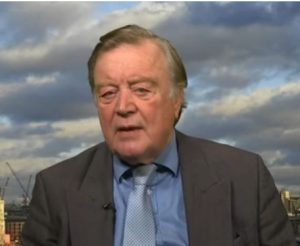
In the preceding article, on the People’s Vote, I argued that the process should be given significantly more time.
But we also have a real problem: both of the big parties are too fractured either to govern or to face a General Election. The unedifying results create the opposite of the sense of stability needed for such the People’s Vote.
This is the time for a Government of National Unity bringing people together from across Parliament, not as a formal coalition between parties, but as an interim arrangement, which would need a more collaborative way of working. The obvious person to lead this is Kenneth Clarke. This is partly because of his own considerable depth and experience. Age means he is also likely to stand down at the next General Election, so it would be clear that the Government of National Unity is there to provide stability in an exceptional time without being subsequently returned to power. He is also sufficiently unpopular with the right wing of his own party to mean that MPs from across the Commons could support him.
The clear message from forming a Government of National Unity is that we are in exceptional times. Something exceptional needs to happen to enable the People’s Vote to happen fairly. Frustration with politics will have produced a different way of doing politics.
How can a Government of National Unity form?
Under the Fixed Term Parliaments Act, an election happens if the Commons passes a motion that it has no confidence in the government and doesn’t then pass a motion that it does have confidence within a fortnight. With sufficient agreement among MPs in advance, it would be possible for Tory MPs to vote with the Opposition “no confidence” in Theresa May’s government, and then “confidence” in the Government of National Unity.
What would a Government of National Unity do?
It would have three tasks:
- People’s Vote
To provide the stability to enable the People’s Vote to take place in an orderly way (described in the first part of this article). - Enable government
Get on with the things that have been sidelined in the last two years because of Brexit, such as urgent changes to Universal Credit. It would also be a good time to begin the overdue cross-party thinking on the future of the NHS. It would have to be doing things that have the broad consensus of parliament, so it would clearly be listening, but this only really rules out things from the political extremes. - Enable political change
There are deep divisions in both the Conservatives and Labour. Both face the question of whether to split or to re-unite. As the SDP found, it is very hard in our system to set up the infrastructure of a new party and get it to a point where it can run a General Election campaign. That provides a huge pressure against change because a party dividing would almost certainly precipitate a General Election — if the ruling party splits, it loses its majority, and if the main opposition splits, it tempts the Government to seek an immediate election. But in the context of a Government of National Unity there is space for both parties to make an active decision to re-unite or divide.
This does mean that the Government of National Unity should remain in office for long enough after the People’s Vote to enable political parties to draw up manifestos in the light of its result and initial repercussions.
The Brexit process did begin as an attempt to settle an internal Tory party squabble. With adequate preparation, overseen by a Government of National Unity, the People’s Vote can become instead something that comes to a mature position on the future of the UK.